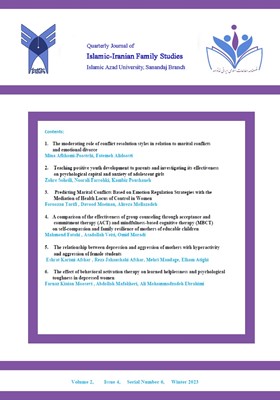Effectiveness of Positive Youth Development Education to Parents on psychological capital and anxiety of female adolescents
Subject Areas : Islamic-Iranian Family Studies Journalzohreh soheili salek 1 , noorali Farrokhi 2 * , Kambiz Poushaneh 3
1 - Psychology Faculty of Psychology and Educational Sciences, Azad University, Central Tehran Branch, Tehran, Iran
2 - Associate professor Assessment &measurement department Psychology&Education Faculty Allameh Tabataba'i University
3 - Assistant Professor, Department of Curriculum Planning, Islamic Azad University, Tehran Center Branch, Tehran, Iran
Keywords: Positive youth development, Positive Psychology, adolescents, anxiety, psychological capital,
Abstract :
Aim: The purpose of the research was to teach positive youth development to parents and to investigate its effectiveness on psychological capital and anxiety of adolescent girls. Method: The research method was semi-experimental with pre-test, post-test design and control group. The research population included all the students of the female junior high schools in district one of Tehran city and the research sample was 30 girls, who were selected through available sampling method and randomly placed in groups. The experimental group participated in the positive development training program of Hossein-Abad et al, 2018 during 12 two-hour sessions. The data collection tool was anxiety questionnaire (Spielberger, 1970) and psychological capital (Luthans, 2007). Data were analyzed using SPSS 24 software and analysis of covariance. Result: The results indicated that the mean post-test scores of the experimental group have increased significantly in psychological capital (F=21.199, P<0/05) and there has been a significant decrease in the component of anxiety state (F=4.688, P<0/05), which indicates the effectiveness of teaching positive youth development to parents on anxiety state and psychological capitals of adolescents. Conclusion: Emphasizing the components of the positive youth development in teaching parenting skills to parents leads to the reduction of anxiety in adolescents and the promotion of psychological capital in them.
_||_

